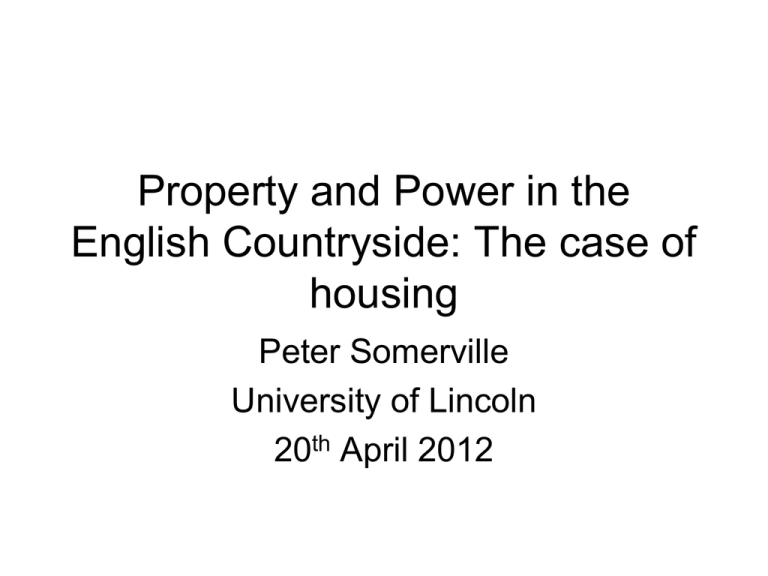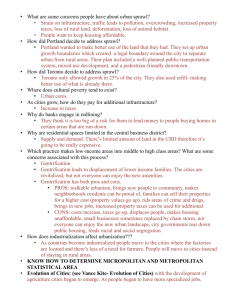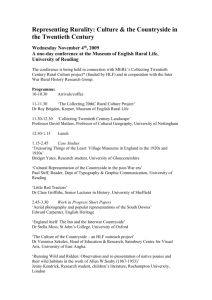Property and Power in the English Countryside: The case of housing Peter Somerville
advertisement

Property and Power in the English Countryside: The case of housing Peter Somerville University of Lincoln 20th April 2012 The rural housing question • See Satsangi et al (2011) – but what is the question? And is it peculiarly English (or British)? • The persistence of class inequality based on property ownership: – a comparatively affluent, immigrant, ex-urban middle class and the remnants of the former agricultural population tied to the locality by their (low paid) employment, by old age and by lack of resources to undertake a move. The former group lives in the countryside mostly by choice (and this includes the majority of farmers and landowners) and has the resources to overcome the problems of distance and access to essential services. The latter group, by contrast, has become increasingly trapped by lack of access to alternative employment, housing and the full range of amenities which the remainder of the population takes for granted. • (Newby, 1980: 273-4) • More than 30 years on, this is much the same, except that most of the former agricultural population has died or moved away, and have been replaced by so-called ‘counter-urbanisers’ Historical background • Resilience of the ‘Anglo’ landed gentry up to early 20th century • Agglomeration and corporatisation in Britain, but expropriation in Eire • ‘Closed parishes’ and ‘open parishes’ (Spencer, 1997) – the dual countryside • The freezing of this rural duality under the Town and Country Planning Act 1947 – non-growth areas and key settlements Post-war changes • Intensified exploitation of (‘productive’) land, with loss of employment and biodiversity (in the non-growth areas) • Expansion of key settlements, e.g. New Towns, market towns • Extensive gentrification of rural areas outside of key settlements A continuing rural social divide • The ‘old’ and the ‘new’ gentry, an alliance of ‘productivist’ and ‘post-productivist’ interests – a single dominant class, based on exclusivity of landownership? • An increasing spatial separation of this class from the rest of society • The exclusivity of both sets of landowner interests (broadly, those of agri-business and of consumers of the rural idyll) is largely reinforced by planning law and development control Revanchism revisited • See Smith (1996) on urban gentrification • Does rural gentrification represent an attempt to eliminate the poor from the countryside? • Gallent & Robinson (2011) – people move away from rural areas mainly to seek employment, not for housing reasons • BUT it is the gentry who have been responsible for the annihilation of jobs in the countryside, aided and abetted by local planning authorities (which they often control, anyway – so-called ‘squirearchies’) Sustainability – the final refuge of the scoundrel? • Non-growth policies are increasingly justified on the grounds that new housing in small villages is not (economically and socially) sustainable • The result is increasing car use, which is of course not environmentally sustainable • In the long term, such restrictions are not socially sustainable either – the villages will ossify and die Rural homelessness • Officially, homelessness is lower in rural areas • However, this is because many people in the countryside who are homeless or at high risk of becoming homeless move to urban areas – further evidence of revanchism Rural housing policy • Basically, it’s about ‘protecting’ the countryside, through restrictions on nonagricultural development, to make it safe for producer-driven agriculture and consumer-driven gentrification • Since at least the 1970s, the contribution of government to the provision of new affordable housing in villages and hamlets has been negligible (and possibly even negative, if account is taken of the effects of the Right to Buy) Future prospects for rural housing – a look on the bright side • Community-led planning – a light at the end of the tunnel? (e.g. Dawlish) • Counter-urbanisation of employment – stopping the rot • Taking sustainability seriously – in both production and consumption • But government must look more seriously at the issue of rural landownership – e.g. the debacle over the proposed privatisation of the Forestry Commission


